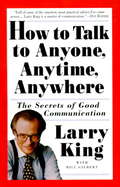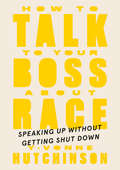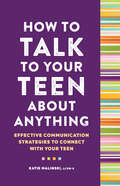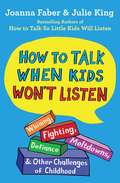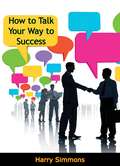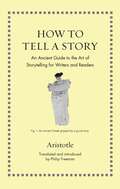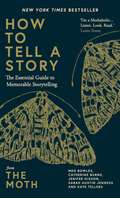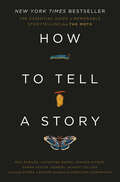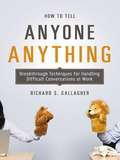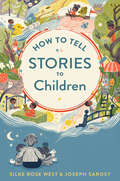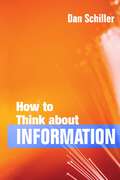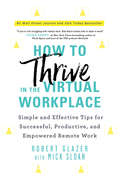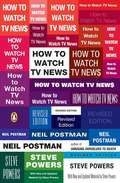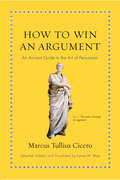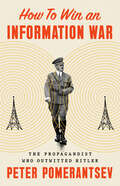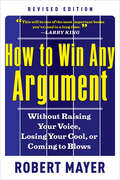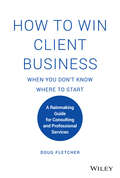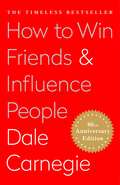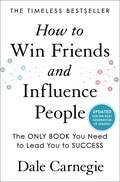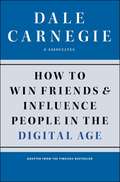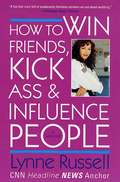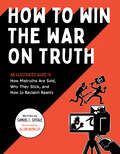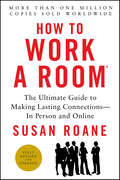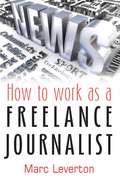- Table View
- List View
How to Talk to Anyone, Anytime, Anywhere: The Secrets of Good Communication
by Larry King Bill GilbertSome find talking to others uncomfortable, difficult, or intimidating. Here is a way to overcome these communication challenges. HOW TO TALK TO ANYONE, ANYTIME, ANYWHERE is the key to building confidence and improving communication skills. Written by Larry King, this guide provides simple and practical advice to help make communication easier, more successful, and even more enjoyable. Anecdotes from a life spent talking--on television, radio, and in person,--add to the fun and value of the book. Learn what famous talkers say and how the way they say it makes them so successful. Lessons include: * How to overcome shyness and put other people at ease * How to choose an appropriate conversation topic for any situation * How to ace a job interview, run a meeting, and mingle at a cocktail party * What the most successful conversationalists have in common * The one great question you can ask to enhance your conversation with anyone, anytime, anywhere From the Hardcover edition.
How to Talk to Your Boss About Race: Speaking Up Without Getting Shut Down
by Y-Vonne HutchinsonAn indispensable practical toolkit for dismantling racism in the workplace without fearReporting and personal testimonials have exposed racism in every institution in this country. But knowing that racism exists isn&’t nearly enough. Social media posts about #BlackLivesMatter are nice, but how do you push leadership towards real anti-racist action?Diversity and inclusion strategist Y-Vonne Hutchinson helps tech giants, political leaders, and Fortune 500 companies speak more productively about racism and bias and turn talk into action. In this clear and accessible guide, Hutchinson equips employees with a framework to think about race at work, prepares them to have frank and effective conversations with more powerful leaders, helps them center marginalized perspectives, and explains how to leverage power dynamics to get results while navigating backlash and gaslighting. How to Talk To Your Boss About Race is a crucial handbook to moving beyond fear to push for change. No matter how much formal power you have, you can create antiracist change at work.
How to Talk to Your Teen About Anything: Effective Communication Strategies to Connect with Your Teen
by Katie MalinskiLearn how to communicate with your teen They want independence but need to know you're there. They need guidance, but they don't want advice. They'll chat with their friends, but not with you. Breaking the wall of silence with your teen can sometimes be difficult, but it's possible to find connection and have really good talks when you know how. This supportive parenting book provides communication tools, advice, and relatable real-life stories that will help you get the conversation started and strengthen your relationship with your teen. What sets How to Talk to Your Teen About Anything apart from other books on parenting teens: Key communication skills—Learn essential communication techniques, including active listening and emotional regulation, and how to deal with communicating in the digital age. Teen parenting 101—Explore what teens want from life and how you can find a balance between discipline, support, and letting go. Recognize your patterns—Understand your patterns, and learn how to set healthy emotional boundaries that will help you prepare for things like sex education (aka "the talk"), and inspire your teen to open up about sensitive topics. Open the lines of communication and bond with them every day using How to Talk to Your Teen About Anything.
How to Talk When Kids Won't Listen: Whining, Fighting, Meltdowns, Defiance, and Other Challenges of Childhood (The How To Talk Series)
by Joanna Faber Julie KingAn all-new guide from the mega-bestselling How To Talk series applies trusted and effective communication strategies to the toughest challenges of raising children.For forty years, readers have turned to Adele Faber and Elaine Mazlish&’s How To Talk So Kids Will Listen & Listen So Kids Will Talk, the book The Boston Globe called, &“the parenting Bible,&” for a respectful and practical approach to communication with children. Expanding upon this work, Adele&’s daughter, Joanna Faber, along with Julie King, coauthored the bestselling book, How To Talk So Little Kids Will Listen. Now, Faber and King have tailored How To Talk&’s tried and trusted communication strategies to some of the most challenging childhood moments. From tantrums to technology to talking to kids about tough topics, How To Talk When Kids Won&’t Listen offers concrete strategies for these and many more difficult situations. Part One introduces readers to the How To Talk &“toolbox,&” with whimsical cartoons demonstrating the basic communication skills that will transform readers&’ relationships with children in their lives. In Part Two, Joanna and Julie answer specific questions and share relatable stories, offering practical tools for addressing issues such as homework hassles, sibling battles, digital dilemmas, problems with punishment, and more. Readers can turn directly to any topic of interest and find the help they need, with handy &“reminder pages.&” Through the combination of lively stories from real parents and teachers, humorous illustrations, and entertaining exercises, How To Talk When Kids Won&’t Listen offers real solutions to struggles familiar to every parent, grandparent, teacher, and anyone else who lives or works with children.
How to Talk Your Way to Success
by Harry SimmonsHave you ever stopped to think how much “talk” occurs in our own little busy world every day of our lives?Do you realize how much talk is involved in our jobs in everyday business? How everything we do every day of our lives involves conversation and speech on many different topics?Our conversations in our household and community affairs, at our desk in the office, out in the factory or on the road, with our fellow workers, executives, vendors, customers, visitors, friends—all these involve thousands of words every day in our lives.Imagine what help it might be to your prospects of success if all your talk and conversation were consciously directed to specific objectives and goals of accomplishment. Think of the pleasant and desirable things that might happen if your talks, your conversations, your letters, your telephone messages, your public appearances all were consciously channeled along the road to success.This book has as its major purpose the directing of all these words into proper, efficient, and effective lines of communication.
How to Tell a Story: An Ancient Guide to the Art of Storytelling for Writers and Readers (Ancient Wisdom for Modern Readers)
by AristotleAn inviting and highly readable new translation of Aristotle’s complete Poetics—the first and best introduction to the art of writing and understanding storiesAristotle’s Poetics is the most important book ever written for writers and readers of stories—whether novels, short fiction, plays, screenplays, or nonfiction. Aristotle was the first to identify the keys to plot, character, audience perception, tragic pleasure, and dozens of other critical points of good storytelling. Despite being written more than 2,000 years ago, the Poetics remains essential reading for anyone who wants to learn how to write a captivating story—or understand how such stories work and achieve their psychological effects. Yet for all its influence, the Poetics is too little read because it comes down to us in a form that is often difficult to follow, and even the best translations are geared more to specialists than to general readers who simply want to grasp Aristotle’s profound and practical insights. In How to Tell a Story, Philip Freeman presents the most readable translation of the Poetics yet produced, making this indispensable handbook more accessible, engaging, and useful than ever before.In addition to its inviting and reliable translation, a commentary on each section, and the original Greek on facing pages, this edition of the Poetics features unique bullet points, chapter headings, and section numbers to help guide readers through Aristotle’s unmatched introduction to the art of writing and reading stories.
How to Tell a Story: The Essential Guide to Memorable Storytelling from The Moth
by The Moth Meg Bowles Catherine Burns Jenifer Hixson Sarah Austin Jenness Kate TellersNEW YORK TIMES BESTSELLER - The definitive guide to telling an unforgettable story in any setting, drawing on twenty-five years of experience from the storytelling experts at The MothYou are a multitude of stories. Every joy and heartbreak, every disappointment and dizzying high, has the makings of an unforgettable story. Whether your goal is to deliver the perfect wedding toast, give a moving eulogy, ace a job interview or simply connect more deeply to those around you, The Moth is here to help. A leader in the modern storytelling movement, The Moth inspires thousands of people around the globe to share their stories each year.In this book, the Moth team reveal the secrets of their time-honed process and use examples from beloved storytellers like Neil Gaiman, Elizabeth Gilbert, Nikesh Shukla, Sarfraz Manzoor and more, to show you how to:* mine your memories for your best stories* explore structures that will boost the impact of your story* deliver your stories with confidence* tailor your stories for any occasionFilled with empowering, easy-to-follow tips, this book will help you to unleash the power of storytelling on your life.
How to Tell a Story: The Essential Guide to Memorable Storytelling from The Moth
by The Moth Meg Bowles Catherine Burns Jenifer Hixson Sarah Austin Jenness Kate TellersNEW YORK TIMES BESTSELLER • The definitive guide to telling an unforgettable story in any setting, drawing on twenty-five years of experience from the storytelling experts at The Moth &“From toasts to eulogies, from job interviews to social events, this book will help you with ideas, structure, delivery and more.&”—CNNLONGLISTED FOR THE PORCHLIGHT BUSINESS BOOK AWARDOver the past twenty-five years, the directors of The Moth have worked with people from all walks of life—including astronauts, hairdressers, rock stars, a retired pickpocket, high school students, and Nobel Prize winners—to develop true personal stories that have moved and delighted live audiences and listeners of The Moth&’s Peabody Award–winning radio hour and podcast. A leader in the modern storytelling movement, The Moth inspires thousands of people around the globe to share their stories each year. Now, with How to Tell a Story, The Moth will help you learn how to uncover and craft your own unique stories, like Moth storytellers Mike Birbiglia, Rosanne Cash, Neil Gaiman, Elizabeth Gilbert, Padma Lakshmi, Darryl &“DMC&” McDaniels, Tig Notaro, Boots Riley, Betty Reid Soskin, John Turturro, and more. Whether your goal is to make it to the Moth stage, deliver the perfect wedding toast, wow clients at a business dinner, give a moving eulogy, ace a job interview, be a hit at parties, change the world, or simply connect more deeply to those around you, stories are essential. Sharing secrets of The Moth&’s time-honed process and using examples from beloved storytellers, a team of Moth directors will show you how to • mine your memories for your best stories• explore structures that will boost the impact of your story• deliver your stories with confidence• tailor your stories for any occasion Filled with empowering, easy-to-follow tips for crafting stories that forge lasting bonds with friends, family, and colleagues alike, this book will help you connect authentically with the world around you and unleash the power of story in your life.
How to Tell Anyone Anything: Breakthrough Techniques for Handling Difficult Conversations at Work
by Richard GallagherNo one likes to be criticized. But when feedback is necessary—whether it’s with a boss, someone we manage, or another co-worker—it takes great communication skills to successfully get the message across with feelings and relationships intact.Drawing from the latest in psychology on how best to connect with others, How to Tell Anyone Anything steers readers away from the common mistake of focusing on what’s wrong, and shows them instead how to provide clear, constructive, positive messages that create real behavior and performance change. Complete with illuminating examples and a unique step-by-step process, the book gives readers powerful insight into how we all react naturally to criticism—and how to transform interactions that might become verbal tugs-of-war into collaborative, problem-solving sessions.
How to Tell Stories to Children: And Everyone Else Too
by Joseph Sarosy Silke Rose WestStorytelling is one of the oldest and most essential skills known to humankind, a timeless parenting tool that helps families celebrate life&’s joys, navigate its challenges, and raise healthy, well-adjusted kids. Stories help children manage their emotions, empathize with others, and better understand the complex world we live in. More importantly, storytelling cultivates a rich and meaningful bond between storyteller and listener, building intimacy and trust between parent and child. In this delightful book, Silke Rose West and Joseph Sarosy—early childhood educators with thousands of storytelling hours between them—distill the key ingredients of storytelling into a surprisingly simple method that can make anyone an expert storyteller. Their intuitive technique uses events and objects from your child&’s daily life to make storytelling easy and accessible. By shifting the focus from crafting a narrative to strengthening your relationship with your child, this book will awaken skills you never knew you had. Complete with practical advice, helpful prompts, and a touch of science to explain how stories enrich our lives in so many ways, How to Tell Stories to Children is a must-read for parents, grandparents and educators.
How to Think about Information
by Dan SchillerIt is common wisdom that the U.S. economy has adapted to losses in its manufacturing base because of the booming information sector, with high-paying jobs for everything from wireless networks to video games. We are told we live in the Information Age, in which communications networks and media and information services drive the larger economy. While the Information Age may have looked sunny in the beginning, as it has developed it looks increasingly ominous: its economy and benefits grow more and more centralized--and in the United States, it has become less and less subject to democratic oversight. Corporations around the world have identified the value of information and are now seeking to control its production, transmission, and consumption. In How to Think about Information, Dan Schiller explores the ways information has been increasingly commodified as a result and how it both resembles and differs from other commodities. Through a linked series of theoretical, historical, and contemporary studies, Schiller reveals this commodification as both dynamic and expansionary, but also deeply conflicted and uncertain. He examines the transformative political and economic changes occurring throughout the informational realm and analyzes key dimensions of the process, including the buildup of new technological platforms, the growth of a transnationalizing culture industry, and the role played by China as it reinserts itself into an informationalized capitalism.
How to Thrive in the Virtual Workplace: Simple and Effective Tips for Successful, Productive, and Empowered Remote Work
by Robert GlazerThe remote work revolution has been rapidly accelerated by the COVID-19 pandemic. Organizations as big as Twitter have learned their employees didn't need an office to get great results, and employees are using the flexibility of remote work to live where they want, ditch their commutes and live a work-life integration that works for them.Remote work is here to stay, and the companies that do it well will have a clear competitive advantage in the future. As founder and CEO of Acceleration Partners, a 100 percent remote organization with 170 employees who work from home, Robert Glazer has discovered that with the right principles, tactics and tools for managing remote employees, many businesses can excel in a virtual world. In this highly actionable book, Glazer shares how he and his team built a remote organization that has been recognized with dozens of awards for its industry performance and company culture.How to Thrive in the Virtual Workplace shares insights from the remote employee, manager and leader perspectives, offering a blueprint any person can use to make remote work successful, productive and fulfilling. Learn how to leverage the flexibility of remote work, be more productive while working at home, avoid burnout, lead a team of virtual employees and build an organization that sets the gold standard for virtual work.The remote work revolution is here—the leaders who will build the future are the ones who can lead top performing virtual teams. Learn how to build a world-class organization—office no longer required.
How To Watch TV News
by Neil Postman Steve PowersA scathing and prescient look at television news,now updated for the new tech-savvy generation Television news : genuine information or entertainment fodder? Fifteen years ago, Neil Postman, a pioneer in media education and author of the bestselling Amusing Ourselves to Death, and Steve Powers, an award-winning broadcast journalist, concluded that anyone who relies exclusively on their television for accurate world news is making a big mistake. A cash cow laden with money from advertisers, so-called news shows glut viewers with celebrity coverage at the cost of things they really should know. Today, this message is still appallingly true but the problems have multiplied? along with the power of the Internet and the abundance of cable channels. A must-read for anyone concerned with the way media is manipulating our worldview, this newly revised edition addresses the evolving technology and devolving quality of America?s television news programming.
How to Win an Argument: An Ancient Guide to the Art of Persuasion
by Marcus Tullius Cicero James M. MayAll of us are faced countless times with the challenge of persuading others, whether we're trying to win a trivial argument with a friend or convince our coworkers about an important decision. Instead of relying on untrained instinct--and often floundering or failing as a result--we'd win more arguments if we learned the timeless art of verbal persuasion, rhetoric. How to Win an Argument gathers the rhetorical wisdom of Cicero, ancient Rome's greatest orator, from across his works and combines it with passages from his legal and political speeches to show his powerful techniques in action. The result is an enlightening and entertaining practical introduction to the secrets of persuasive speaking and writing--including strategies that are just as effective in today's offices, schools, courts, and political debates as they were in the Roman forum.How to Win an Argument addresses proof based on rational argumentation, character, and emotion; the parts of a speech; the plain, middle, and grand styles; how to persuade no matter what audience or circumstances you face; and more. Cicero's words are presented in lively translations, with illuminating introductions; the book also features a brief biography of Cicero, a glossary, suggestions for further reading, and an appendix of the original Latin texts.Astonishingly relevant, this unique anthology of Cicero's rhetorical and oratorical wisdom will be enjoyed by anyone who ever needs to win arguments and influence people--in other words, all of us.
How to Win an Information War: The Propagandist Who Outwitted Hitler
by Peter PomerantsevFrom one of our leading experts on disinformation, this inventive biography of the rogue WWII propagandist Sefton Delmer confronts hard questions about the nature of information war: what if you can't fight lies with truth? Can a propaganda war ever be won? In the summer of 1941, Hitler ruled Europe from the Atlantic to the Black Sea. Britain was struggling to combat his powerful propaganda machine, crowing victory and smearing his enemies as liars and manipulators over his frequent radio speeches, blasted out on loudspeakers and into homes. British claims that Hitler was dangerous had little impact against this wave of disinformation. Except for the broadcasts of someone called Der Chef, a German who questioned Nazi doctrine. He had access to high-ranking German military secrets and spoke of internal rebellion. His listeners included German soldiers and citizens, as well as politicians in Washington DC who were debating getting into the war. And--most importantly--Der Chef was a fiction. He was a character created by the British propagandist Thomas Sefton Delmer, a unique weapon in the war. Then, as author Peter Pomerantsev seeks to tell Delmer's story, he is called into a wartime propaganda effort of his own: the US response to the invasion of Ukraine. In flashes forward to the present day, Pomerantsev weaves in what he's learning from Delmer as he seeks to fight against Vladimir Putin's tyranny and lies. This book is the story of Delmer and his modern investigator, as they each embark on their own quest to manipulate the passions of supporters and enemies, and to turn the tide of an information war, an extraordinary history that is informing the present before our eyes.
How to Win Any Argument
by Robert MayerThis guide to negotiating is “mental judo, where you use the other guy’s energy to win. It’s mind-set. It’s charisma” (New York Times).The art of the argument. It’s mysterious and powerful. It’s the art of having things go your way. But it’s also the art of getting out of your own way. It’s having the Moves. But it’s also about having the Touch. Welcome to the “new normal.” It’s a time and place where conversations are tougher, disagreements more frequent, consensus more difficult to find than ever before. This new world demands three new “right for our times” chapters:“Heavy Metal Moves” and “Taboo Tactics”: When you’re being dissed, dismissed, and dumped on. Or when you need to break through.“Waging Peace: The Mediation, Arbitration, and Collaborative Practice Game”: Because there’s more conflict but less money to hire litigation lawyers.“The World Has Gotten Smaller”: Learn to identify deep-rooted cultural differences, and how to act and react.“This will be one of the most important books you’ve read in a long time.” —Larry King“Two thumbs up! A whole new way of being smart about all the people in your life—coworkers, bosses, family, the people you do business with. Bob Mayer tells you how to finesse the results you want without pleading, prodding, pushing, or pulling.” —Cuba Gooding, Jr., Academy Award–winning actor
How to Win Client Business When You Don't Know Where to Start: A Rainmaking Guide for Consulting and Professional Services
by Doug FletcherDramatically grow your client base following pragmatic and insightful advice by bestselling author Doug Fletcher How to Win Client Business When You Don't Know Where to Start: A Rainmaking Guide for Consulting and Professional Services serves as an invaluable and indispensable guide for everyone in the business of selling professional and consulting services. Author Doug Fletcher dives deeply into the five skills required to "make it rain": Create Your Personal Brand Identity Demonstrate Your Professional Expertise Build Your Professional Ecosystem Develop Trust-Based Relationships Practice Everyday Success Habits How to Win Client Business When You Don't Know Where to Start provides a masterclass in teaching the practical techniques and concrete strategies that professional services providers were never taught in school or on the job. Pragmatic lessons take the place of the vaguely defined principles found in competing books to turn readers from sales novices into rainmakers. Written by the same celebrated author who brought readers the best-selling book How Clients Buy, How to Win Client Business When You Don't Know Where to Start is perfect for any professional services provider or consultant who seeks to dramatically increase their book of business.
How To Win Friends and Influence People: Large Print Edition (Deluxe Hardbound Edition Ser.)
by Dale CarnegieYOU CAN GO AFTER THE JOB YOU WANT...AND GET IT! YOU CAN TAKE THE JOB YOU HAVE...AND IMPROVE IT! YOU CAN TAKE ANY SITUATION YOU'RE IN...AND MAKE IT WORK FOR YOU! For more than sixty years the rock-solid, time-tested advice in this book has carried thousands of now famous people up the ladder of success in their business and personal lives. Now this previously revised and updated bestseller is available as eBook for the first time to help you achieve your maximum potential throughout the next century! Learn: * THREE FUNDAMENTAL TECHNIQUES IN HANDLING PEOPLE* THE SIX WAYS TO MAKE PEOPLE LIKE YOU* THE TWELVE WAYS TO WIN PEOPLE TO YOUR WAY OF THINKING* THE NINE WAYS TO CHANGE PEOPLE WITHOUT AROUSING RESENTMENT
How to Win Friends and Influence People: Updated For the Next Generation of Leaders (Deluxe Hardbound Edition Ser.)
by Dale CarnegieUpdated for the first time in more than forty years, Dale Carnegie&’s timeless bestseller How to Win Friends and Influence People—a classic that has improved and transformed the personal and professional lives of millions.This new edition of the most influential self-help book of the last century has been updated under the care of Dale&’s daughter, Donna, introducing changes that keep the book fresh for today&’s readers, with priceless material restored from the original 1936 text. One of the best-known motivational guides in history, Dale Carnegie&’s groundbreaking publication has sold tens of millions of copies, been translated into almost every known written language, and has helped countless people succeed. Carnegie&’s rock-solid, experience-tested advice has remained relevant for generations because he addresses timeless questions about the art of getting along with people. How to Win Friends and Influence People teaches you: -How to communicate effectively -How to make people like you -How to increase your ability to get things done -How to get others to see your side -How to become a more effective leader -How to successfully navigate almost any social situation -And so much more! How to Win Friends and Influence People is a historic bestseller for one simple reason: Its crucial life lessons, conveyed through engaging storytelling, have shown readers how to become who they wish to be. With the newly updated version of this classic, that&’s as true now as ever.
How to Win Friends and Influence People in the Digital Age (Dale Carnegie Books)
by Dale Carnegie AssociatesAN UP-TO-THE -MINUTE ADAPTATI ON OF DALE CARNEGIE 'S TI MELE SS PRESCRIPTI ONS FOR THE DIGITAL AGE DALE CARNEGIE's commonsense approach to communicating has endured for a century, touching millions and millions of readers. The only diploma that hangs in Warren Buffett's office is his certificate from Dale Carnegie Training. Lee Iacocca credits Carnegie for giving him the courage to speak in public. Dilbert creator Scott Adams called Carnegie's teachings "life-changing." In today's world, where more and more of our communication takes place across wires and screens, Carnegie's lessons have not only lasted but become all the more critical. Though he never could have predicted technology's trajectory, Carnegie proves a wise and helpful teacher in this digital landscape. To demonstrate the many ways his lessons remain relevant, Dale Carnegie & Associates, Inc., has reimagined his prescriptions and his advice for this difficult digital age. We may communicate today with different tools and with greater speed, but Carnegie's advice on how to communicate, lead, and work efficiently remains priceless across the ages.
How to Win Friends, Kick Ass and Influence People
by Lynne RussellAfter fifteen years of international exposure as an anchor for CNN's Headline News, Lynne Russell has become one of the most recognized and beloved women working in broadcast journalism. Renowned for her on-air combination of professionalism and irrepressible energy, Russell is every bit as remarkable off camera as she is on. Not only does she know her way around a newsroom, but as a private investigator, bodyguard, and black belt, she is a force to be reckoned with.Russell writes, for the first time, about her amazing life, from her memories of childhood as a self-described nomad following her army father around the globe, to a frank look at her ill-advised early marriage, to her steady rise through the ranks of radio and television. Then she turns her attention to what her remarkable achievements have taught her about work, love, body language, and the best little shoe store on the Champs Elysée, and gives us her gutsy advice for life today.
How to Win the War on Truth: An Illustrated Guide to How Mistruths Are Sold, Why They Stick, and How to Reclaim Reality
by Samuel C. SpitaleMade to Stick by Chip Heath meets Thing Explainer by Randall Munroe in this illustrated guide to navigating today&’s post-truth landscape, filled with real-world examples of disinformation campaigns.The average person receives 4,000 to 10,000 media messages a day. It&’s no wonder we struggle to separate the news from the noise and fact from fiction--but in these unprecedented times, it&’s essential to democracy that we do. For anyone struggling to figure out how to live--and vote--their values, How to Win the War on Truth is here to help. You&’ll learn: • The history of propaganda, from Edward Bernays to Fox News • Why simple messages are so powerful • How social messaging creates unconscious biases • Who profits from propaganda • How propaganda is manufactured and delivered directly to you Filled with real-world examples of disinformation campaigns that impact every citizen and clever illustration, How to Win the War on Truth will help you see the world with clear eyes for the first time.
How to Work a Room: The Ultimate Guide to Making Lasting Connections—In Person and Online
by Susan RoAneFully revised and updated, the ground-breaking, classic book on improving communication and socializing skills in any situation to succeed in business and lifeHave you ever walked into a roomful of strangers and felt uncomfortable? If the answer is yes, you’re not alone! Over 85% of American adults feel the same way. The solution: How to Work a Room, the fully revised Silver Anniversary edition, which has sold over 1.2 million copies worldwide. Drawing from her vast experiences working with top industry leaders such as Coca-Cola, Apple, the NFL, and UnitedHealth, Susan RoAne presents easy-to-implement strategies to exude more confidence, win over your colleagues, and achieve more. Simple and effective, you’ll learn how to:approach someone you don’t know, in person or onlineremember names (and what to do if you don't)start, maintain, and end conversations… graciouslyuse humor, and when not to do sofollow simple but often unspoken rules of etiquetteIf you hope to make a stronger impression, get more use out of your professional connections, or turn a new acquaintance into a valued, long-lasting relationship, How to Work a Room is the vital tool for succeeding in business and life.
How to work as a Freelance Journalist
by Marc LevertonThis book contains all you need to know to work as a freelance journalist. It is the perfect introduction for career changers, writers, university graduates, school and college leavers, communications professionals and anybody who just wants a rewarding part-time challenge. In it you'll discover: *the tools of the trade - news, views, reviews, opinion pieces, feature writing, travel writing, music writing, sports writing and business writing *what it's like to step into the unknown and become self-employed *how to pitch your ideas to editors *how to brainstorm ideas *how to market yourself as a freelance journalist. You'll also find tips and advice from successful freelance journalists and editors, plus a useful self-employment checklist.
